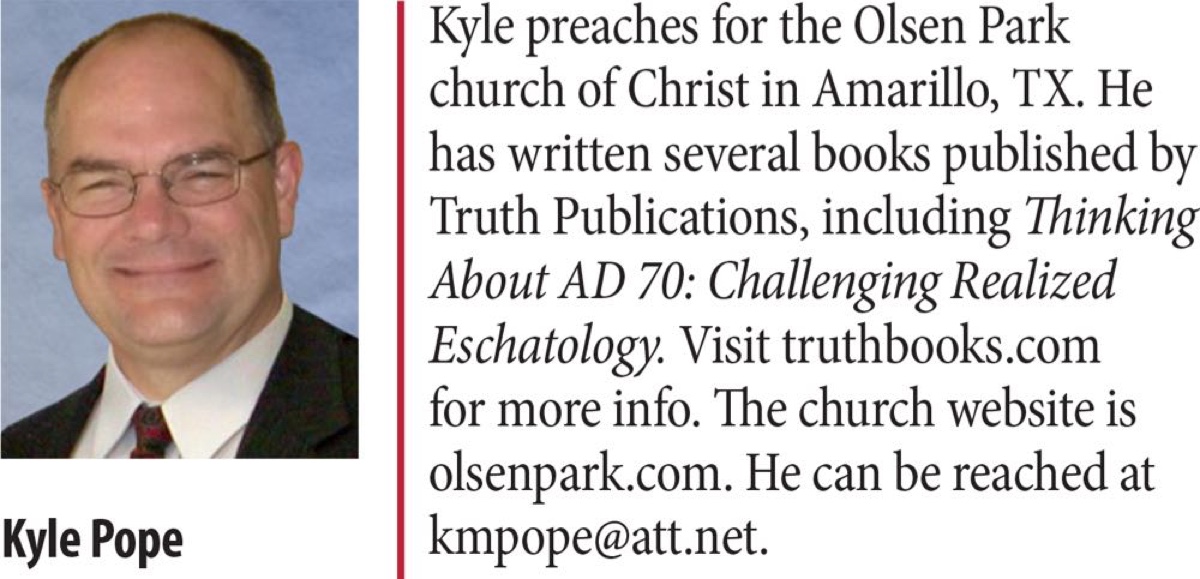By Kyle Pope
Synopsis: Paul asked this question of the Galatians. Sadly, far too often, people allow others and circumstances to hinder them from obedience to the Lord. An awareness of this danger can help us prevent allowing this to happen to us.
In Paul’s letter to the churches in Galatia, he asks them the question, “You ran well. Who hindered you from obeying the truth?” (Gal. 5:7, NKJV). What does it mean to obey the truth? The phrase is used of those who have never begun to follow Christ. Peter warned, “For the time has come for judgment to begin at the house of God; and if it begins with us first, what will be the end of those who do not obey the gospel of God?” (1 Pet. 4:17). Paul prophesied of God’s “taking vengeance on those who do not know God, and on those who do not obey the gospel of our Lord Jesus Christ” (2 Thess. 1:8). These souls stand outside of Christ. They have not put faith in Jesus, turned from sin, confessed Him and been baptized into Christ. They are lost in sin. Some reading this may be like that. You know what to do; you know you have sinned, but something hinders you. The phrase can also apply to Christians who do not continue to obey. This is the emphasis of Galatians 5:7. They were Christians who had turned from the truth to error. I suspect there may be some reading this who are in a similar state. No one sees it. You look faithful, but your soul is in peril. Let’s think about this question in a very personal way. If you are not obedient to the truth, I urge you to ask yourself the question, “Who hindered you from obeying the truth?”
Friends. Rehoboam asked for advice from the elders who had served his father, but also from his friends. He chose to follow the bad advice of his friends and lost the people—and most of the kingdom—because of it (1 Kings 12). You may have been hindered from obeying the truth because you thought your friends wouldn’t like you anymore if you followed God. You were afraid they would think you were strange. What does God think about your choice?
Family. Jesus said, “a man’s enemies will be those of his own household” (Matt. 10:36). If our family hinders us from following God, that can be the case. We don’t choose our family, nor can we abandon them, but we don’t have to let them cause us to lose our soul. Job’s wife could have hindered him, but he was faithful to God despite her discouraging attitudes towards him (Job 2:9-10).
Peers. John’s gospel records the sad fact that some among the Jews actually believed in Jesus but refused to confess Him, because “they loved the praise of men more than the praise of God” (John 12:43). We often worry about how we look to others, sometimes even to those we don’t know. Why is it that we care so much about what people think of us, even when they don’t even know us? Why is it that we care so little about what the Savior thinks about us when He knows us better—and cares more—than anyone?
Yourself. The Wise man wrote, “He who is slow to anger is better than the mighty, and he who rules his spirit than he who takes a city” (Prov. 16:32). Sadly, we are often our own worst enemy. When we fail to exercise self-control and restraint, it is not so much a question of “who” is the hindrance, but “what” we have allowed to hinder us from obedience to the Lord. When the Ethiopian nobleman learned the truth, he didn’t allow anything to stand in his way. He asked Stephen, “What hinders me from being baptized?” (Acts 8:36b). Will you allow something in your life to hinder you from obeying the truth?
Fear of Failure. In the Parable of the Talents, the man who was given one talent was afraid that his master would expect more from him than he could deliver. He allowed his fear to keep him from doing anything (Matt. 25:24-30). Certainly, all who begin to follow Christ will stumble, but we only fail if we stop fighting to get back up as quickly as we can when we realize that we have done wrong. What each of us must realize is that, if the fear of failure is what hinders us from obeying the truth—failing to obey the gospel is failure, not a way to avoid failure!
Thinking We Have Time. Jesus told a parable about a rich man who assumed that he had time and built bigger barns, but was not “rich toward God” when he died unexpectedly (Luke 12:16-21). The story is told of an ancient king who lit lamps all around his palace; then he sent a herald to proclaim that all criminals who would come to his palace while the lamps burned could be pardoned. When the lamps went out, it would be too late. What if we wait until the lamps burn out on our opportunity to experience God’s mercy? Paul talked with the Roman governor Felix about the gospel. When he grew afraid, he told him to go away until he had a “convenient time” (Acts 24:24-25). On August 24, AD 79, a mountain in Italy known as Vesuvius erupted, spewing a cloud of gas and ash into the air, which descended on the towns of Pompei and Herculaneum. Citizens who were in the city were buried in the ash with no time to escape. Josephus tells us that Felix—who thought he would have a “convenient time” in which he could speak to Paul again, died there that day (Antiquities 20.7.2). Don’t let this be what hinders you.
Fear of Men. Jesus taught: “My friends, do not be afraid of those who kill the body, and after that have no more that they can do. But I will show you whom you should fear: Fear Him who, after He has killed, has power to cast into hell; yes, I say to you, fear Him!” (Luke 12:4-5). I heard a news report some years ago about a woman who struggled with an intruder who attacked her in her house. Despite her fear, she fought the man and strangled him to death. The fear we may feel from men must be put into perspective. However, it is nothing compared to the absolute terror we may one day feel if we find our souls unprepared in the hands of Him who is able to cast both soul and body into hell.
Love of the World. This world offers many pleasures, but none of them will last forever. The apostle John warns us not to love these things, because all of them are “passing away” (1 John 2:15-17). How foolish and remorseful we will feel one day if we have sacrificed our souls for the few minutes of pleasure this life has to offer, only to forfeit an eternity of joy, peace, and satisfaction with our heavenly Father.
Carelessness. The church in Laodicea was rebuked because they were “neither cold nor hot,” but only “lukewarm” (Rev. 3:14-16). Ours is a world of apathy. There are few zealots. There are few genuine rebels. Many just can’t find any reason within them to even care about faith in God. Care about something often comes only after we see the consequence of carelessness. Don’t let carelessness hinder you—too much is at stake.
Doubt. James wrote: “He who doubts is like a wave of the sea driven and tossed by the wind” (Jas. 1:6). You can’t pin down a wave: It is ever changing. It doesn’t commit itself to stay in one place but moves as soon as it has started in one direction. Some people are like that. History tells of an Anglo-Saxon king named Redwald (c. 599-624) who ruled East Anglia in the ancient British Isles. He would not commit to follow Christ fully, so in the same church building, he set up an altar to Christ and an altar to pagan gods. Don’t let doubt hinder you!
Slavery to Sin. Jesus taught, “whoever commits sin is a slave of sin” (John 8:34). Being a Christian isn’t easy. It demands that we deny self and submit to God. Perhaps what hinders you is sin. Perhaps you like to drink a little. Maybe you engage in immorality. You may want the freedom to sleep in on Sunday, use whatever kind of profanity you want, wear whatever clothing you wish, and have friends with whom you do whatever you please. That makes you feel free, but you are actually in the worst kind of slavery imaginable. I once met a man who “hacked paint”—a practice that involved spraying paint into a paper bag and inhaling it for the high it provided. He started doing it for the pleasure it gave. The problem was, a person who engages in such activity destroys his brain little by little as he becomes enslaved to it. That’s how sin is! Whatever sin it may be that hinders us from truly following Christ, it isn’t worth it to sell our soul to it. Don’t let yourself wait until your mind is overcome, your loved ones (in Christ) are alienated from you, and all avenues of rescue are exhausted. Be set free from sin today through obedience to the truth.


